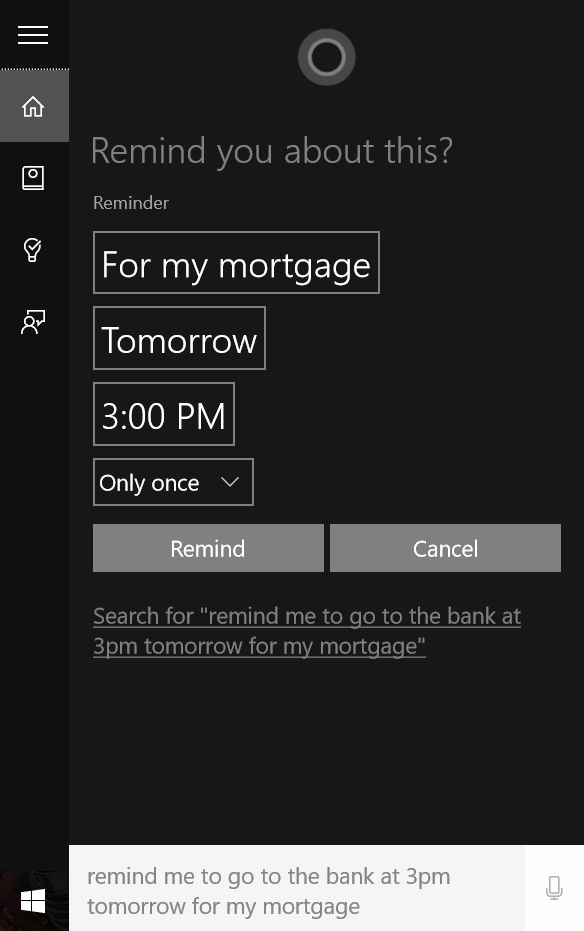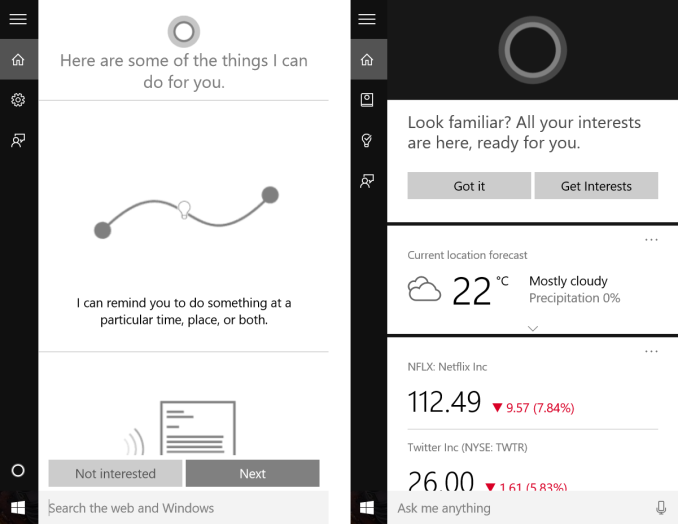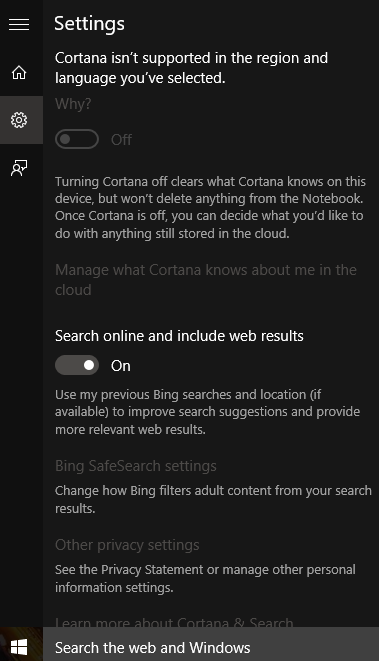The Windows 10 Review: The Old & New Face of Windows
by Brett Howse on August 25, 2015 8:00 AM EST- Posted in
- Operating Systems
- Microsoft
- Windows 10
Changing the Way You Interact With Your PC: Meet Cortana
Digital personal assistants have graced our smartphones for a couple of years now. Traditionally, computers reacted to specific commands. Double click to open calendar. Select tomorrow. Right click. New. Reminder. Meeting about mortgage. At the bank. 3pm. Save. It’s the way it has always been, because as fast as computers are at certain tasks, they don’t speak any languages other than the commands that they know. Google Now, Siri, and Cortana on Windows Phone have allowed us a glimpse at natural language input on mobile devices, Microsoft is extending that functionality to all Windows 10 PCs with Cortana now available on the PC as well..
“Hey Cortana, remind me to go to the bank at 3pm tomorrow for my mortgage”
There is nothing you can do with Cortana that you could not have done manually yourself, but the goal of these digital assistants is to make certain tasks easier. At the moment, Cortana is certainly not an AI being, and as such, is still limited in what commands are possible. Anything that falls outside of the features of Cortana end up in a web search. For a full list of commands, ask Cortana for help and a list will appear. Cortana is able to do contextual searches and replies too, and can respond to follow up questions without having to restate the original question again.
You can use Cortana to search for what music is playing, track your flights, set appointments, give directions, and more. Over time, this will also expand to offer more functionality.
Cortana will of course respond to speech inputs, and can even be set to always be listening for Hey Cortana much like you see on smartphones these days, but it is also just as capable with text based input, and it is smart enough to know that if you talk to it, it can reply in audio, but if you type something in, it will reply with a text response.
Sitting at your desktop, you may be thinking that you don’t need or want this on your PC, since you have it on your phone. If you are someone who uses your PC for any amount of time, being able to type in quick reminders or check calendar appointments can be a great feature. Cortana is also proactive, and knows your appointments and can remind you that you need to leave. Once again there is nothing new here, since smartphones already have this functionality, but for those of us who spend a lot of time at a PC during a day, it is very nice to have this.
I think one of the untapped potentials of Cortana will evolve over time. Microsoft has been pushing to add Cortana support to iOS and Android, and while you may feel that effort is in vain because they already have their own integrated personal assistants, Cortana will be the link between any of your devices. You can set reminders on your PC but if you are out at the gas station with your Android phone, you’ll get notified. Cortana also supports geo-fencing, so you can tell it to remind you to do something the next time you are at a location, and that will work from the desktop to the phone as well, no matter what phone you use.
The one major issue with Cortana at the moment is just how limited it’s deployment is. Microsoft is tuning Cortana to each region where Windows is available, and as such it is only available in seven countries right now, with the U.S., UK, China, France, Italy, Germany and Spain being available at launch. More countries will be coming online in the next couple of months. By tuning the experience to each location, they can ensure that the experience fits in with the culture which varies so greatly across the globe.
I have only had a small glimpse of Cortana on the desktop, although I have used it quite a bit on my phone, because being from Canada I am on the list of countries waiting. But that small glimpse, as well as the integration of Cortana with the rest of the system, shows that Cortana might be one of the most important additions to Windows in this release.













293 Comments
View All Comments
inighthawki - Tuesday, August 25, 2015 - link
Lol this image is so full of crap. Not only can you turn most of it off permanently (And yes, you can disable WU and WD from the services list and it will not start back up) but this image is so misleading. They even photoshopped an ad in the start menu on a setting that doesn't even exist in the RTM build... Come on, that's low. Mos tof the other things such as "tracking keystrokes and browsing history" for wbe browsing exist in Windows 7 and 8. Wi-Fi sense has been known to be blown way out of proportion. Telemtry has also been proven to only provide non-personal information. It collects stuff such as hardware configurations, statistical information like how often you click the start button, and machine crashes. Does this seriously worry you that Microsoft knows that "someone in the world" owns a MacBook pro and clicked the start button 8 times today?You're really just buying into a bunch of fearmongering by a bunch of people who just wanted excuses to continue using Windows 7. If you don't like Windows 10 or don't want to use it, that's fine, but don't cite these ultra poor excuses as the reasons why, as it shows you didn't actually look much further than the surface, and just jumped on the bandwagon.
Notmyusualid - Tuesday, August 25, 2015 - link
Thank you for your (what I believe is an incorrect opinion), but I HAVE EVERYTHING TURNED OFF, and my firewall logs STILL show encrypted packets going out to Microsoft - EVERYTIME I hit a key, and everytime I open a program.So even if somebody starts with a Microsoft Account, their data would be synced to MS, before many would realise what had happened.
There is absoultely nothing you can say that would make me believe that MS deserves access to my contacts. Those are private.
And no, I did not jump on any bandwagon, I did my own testing, came to similar conslusion as the picture stated, and yes, I will be continuing to use Win 7, as I do not like it.
Only Enterprise Editions can disable all modes of telemetry...
inighthawki - Tuesday, August 25, 2015 - link
Oh OK, so you saw encrypted packets going out... So I guess you decrypted them and looked at the content, then? Sending information when certain types of hardware interrupts occur does not mean they are sending personal information or recording your keystrokes like a keylogger. You have no way of knowing what's in the packets, yet you make assumptions that it's a privacy issue. Yet another example of someone pretending they're fully informed because they open up Wireshark and see some packets being sent over the network and "came to a conclusion" about what was really happening.minijedimaster - Tuesday, August 25, 2015 - link
Are you paid to have some shill answer for everything windows 10? "Oh well, so you proved me wrong with your firewall packet captures, but do you REALLY know what it's sending???"LOL, yeah ok... go be a paid shill somewhere else.
inighthawki - Tuesday, August 25, 2015 - link
Sorry if I'm not irrational/paranoid and don't jump to conclusions based on evidence that doesn't actually show any of the claims you're making.Oh no, a network packet! My entire life must now belong to Microsoft's hands!
SlyNine - Tuesday, August 25, 2015 - link
I have to disagree. Your computer sending encrypted packets to Microsoft, even tho you supposedly disabled that stuff, is a HUGE red flag. At that point its up to Microsoft to convince me that they are NOT sending personal information (it shouldn't be sending any). I might have to pass on windows 10 until this gets clarification.imaheadcase - Wednesday, August 26, 2015 - link
Most modern windows OS send data to MS encrypted, almost all programs with internet connectivity do. The OP is prob just looking at the encrypted data it sends to check for windows updates. Has nothing to do with privacy.Holy hell did everyone just step on the jump to conclusions mat. lol
Notmyusualid - Friday, August 28, 2015 - link
It has everything to do with privacy.Every time I press a key, a packet is sent. This is not updates.
Notmyusualid - Friday, August 28, 2015 - link
It IS a Huge Red Flag.This guy is a Microsoft employee.
nikon133 - Sunday, August 30, 2015 - link
You sound like you might be working for competition, though. Apple? Some shady Linux brotherhood? Just saying.